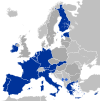- Community acquis
-
European Union 
This article is part of the series:
Politics and government of
the European UnionPolicies and issuesThe Community acquis[1] or acquis communautaire (English pronunciation: /ˈækiː kəˈmjuːnətɛər/, French: [aˌki kɔmynoˈtɛːʁ][2]), sometimes called the EU acquis, and often shortened to acquis,[2] is the accumulated legislation, legal acts, and court decisions which constitute the body of European Union law. The term is French: acquis meaning "that which has been agreed upon", and communautaire meaning "of the community".
Contents
Chapters of the acquis
During the process of the enlargement of the European Union, the acquis was divided into 31 chapters for the purpose of negotiation between the EU and the candidate member states for the fifth enlargement (the ten that joined in 2004 plus Romania and Bulgaria which joined in 2007). These chapters were:
- Free movement of goods
- Free movement of persons
- Freedom to provide services
- Free movement of capital
- Company law
- Competition policy
- Agriculture
- Fisheries
- Transport policy
- Taxation
- Economic and Monetary Union
- Statistics
- Social policy and employment
- Energy
- Industrial policy
- Small and medium-sized enterprises
- Science and research
- Education and training
- Telecommunication and information technologies
- Culture and audio-visual policy
- Regional policy and coordination of structural instruments
- Environment
- Consumers and health protection
- Cooperation in the field of Justice and Home Affairs
- Customs union
- External relations
- Common Foreign and Security Policy (CFSP)
- Financial control
- Financial and budgetary provisions
- Institutions
- Others
For the negotiations with Croatia and Turkey, the acquis was split up into 35 chapters instead, with the purpose of better balancing between the chapters: dividing the most difficult ones into separate chapters for easier negotiation, uniting some easier chapters, moving some policies between chapters, as well as renaming a few of them in the process:
- Free movement of goods
- Freedom of movement for workers
- Right of establishment and freedom to provide services
- Free movement of capital
- Public procurement
- Company law
- Intellectual property law
- Competition policy
- Financial services
- Information society and media
- Agriculture and rural development
- Food safety, veterinary and phytosanitary policy
- Fisheries
- Transport policy
- Energy
- Taxation
- Economic and monetary policy
- Statistics
- Social policy and employment
(including anti-discrimination and equal opportunities for women and men) - Enterprise and industrial policy
- Trans-European networks
- Regional policy and coordination of structural instruments
- Judiciary and fundamental rights
- Justice, freedom and security
- Science and research
- Education and culture
- Environment
- Consumer and health protection
- Customs union
- External relations
- Foreign, security and defence policy
- Financial control
- Financial and budgetary provisions
- Institutions
- Other issues
Correspondence between chapters of the 5th and the 6th Enlargement:
5th Enlargement 6th Enlargement 1. Free movement of goods 1. Free movement of goods 7. Intellectual property law 2. Free movement of persons 2. Freedom of movement for workers 3. Right of establishment and freedom to provide services 3. Freedom to provide services 3. Right of establishment and freedom to provide services 9. Financial services 4. Free movement of capital 4. Free movement of capital 5. Company law 6. Company law 6. Competition policy 8. Competition policy 5. Public procurement 7. Agriculture 11. Agriculture and rural development 12. Food safety, veterinary and phytosanitary policy 8. Fisheries 13. Fisheries 9. Transport policy 14. Transport policy 21. Trans-European networks (one half of it) 10. Taxation 16. Taxation 11. Economic and Monetary Union 17. Economic and monetary policy 12. Statistics 18. Statistics 13. Social policy and employment 19. Social policy and employment
(including anti-discrimination and equal opportunities for women and men)14. Energy 15. Energy 21. Trans-European networks (one half of it) 15. Industrial policy 20. Enterprise and industrial policy 16. Small and medium-sized enterprises 17. Science and research 25. Science and research 18. Education and training 26. Education and culture
10. Information society and media19. Telecommunication and information technologies 20. Culture and audio-visual policy 21. Regional policy and coordination of structural instruments 22. Regional policy and coordination of structural instruments 22. Environment 27. Environment 23. Consumer and health protection 28. Consumer and health protection 24. Cooperation in the field of Justice and Home Affairs 23. Judiciary and fundamental rights 24. Justice, freedom and security 25. Customs union 29. Customs union 26. External relations 30. External relations 27. Common Foreign and Security Policy (CFSP) 31. Foreign, security and defence policy 28. Financial control 32. Financial control 29. Financial and budgetary provisions 33. Financial and budgetary provisions 30. Institutions 34. Institutions 31. Others 35. Other issues Such negotiations usually involved agreeing transitional periods before new member states needed to implement the laws of the European Union fully and before they and their citizens acquired full rights under the acquis.
Other uses of the word acquis
The term acquis is also used to describe laws adopted under the Schengen Agreement, prior to its integration into the European Union legal order by the Treaty of Amsterdam, in which case one speaks of the Schengen acquis.
The term acquis has been borrowed by the World Trade Organization Appellate Body, in the case Japan – Taxes on Alcoholic Beverages, to refer to the accumulation of General Agreement on Tariffs and Trade (GATT) and WTO law ("acquis gattien"), though this usage is not well established.
It has been used to describe the achievements of the Council of Europe (an international organisation unconnected with the European Union):[3]
- The Council of Europe’s acquis in standard setting activities in the fields of democracy, the rule of law and fundamental human rights and freedoms should be considered as milestones towards the great European political project, and the European Court of Human Rights should be recognised as the pre-eminent judicial pillar of any future architecture.
It has also been applied to the body of "principles, norms and commitments" of the Organization for Security and Co-operation in Europe (OSCE):[4]
- Another question under debate has been how the Partners and others could implement the OSCE acquis, in other words its principles, norms and commitments on a voluntary basis.
The Organisation for Economic Cooperation and Development (OECD) introduced the concept of the OECD Acquis in its "Strategy for enlargement and outreach", May 2004.
See also
References
- ^ EuroVoc: Community acquis
- ^ a b Collins English Dictionary. "acquis communautaire". dictionary.com. http://dictionary.reference.com/browse/acquis+communautaire. Retrieved 18 August 2010.
- ^ Section 12, Parliamentary Assembly of the Council of Europe Resolution 1290
- ^ Intervention by Ambassador Aleksi Härkönen, Permanent Representative of Finland to the OSCE, Annual Security Review Conference.
External links
- EUR-Lex: European Union Law.
- JRC-Acquis, Aligned multilingual parallel corpus: 23,000 Acquis-related texts per language, available in 22 languages. Total size: 1 Billion words.
- Translation Memory of the EU-Acquis: Up to 1 Million translation units each, for 231 language pairs.
European Union topics History PredecessorsEuropean Coal and Steel Community (1951–2002) · European Economic Community (1958–1993/2009) · Euratom (1958–present) · European Communities (1967–1993/2009) · Justice and Home Affairs (1993–2009) · DetailsGovernance European Banking Authority · Eurojust · Europol · Frontex · Environment · Reconstruction · Disease Prevention and Control · External Action Service · Maritime SafetyPolitics Elections · European Parliament constituencies · European Parliament groups · Political parties · Enlargement ('95 · '04 · '07) · Integration · Pro-Europeanism · Euroscepticism · Foreign relations · EuromythLaw Acquis · Competition law · Copyright law · Directive · Journal · Government procurement · Four freedoms (Labour mobility) · Procedure · Regulation · Schengen Agreement · Charter of Fundamental Rights · Treaties (Opt-outs) · Enhanced co-operation · Mechanism for Cooperation and VerificationGeography Borders · Extreme points · Largest municipalities · Largest urban areas · Largest metropolitan areas · Larger Urban Zones · Member States · Special territories · RegionsEconomy Currencies · Common Agricultural Policy (CAP) · Common Fisheries Policy · Budget · Euro · Central Bank · Investment Bank · Investment Fund · Eurozone · Energy · Regional development · Single Market · FTAs · Solidarity Fund · Transport (Galileo system)Culture Citizenship (Passports) · Demographics · Driving licence · Education · Institute of Innovation and Technology · Laissez-Passer · Languages · Religion · Sport · Holidays · Telephone numbers · Symbols · Statistics · Douzelage · Greater EuropeLists Theory Portal Categories:- European Union law
- French words and phrases
Wikimedia Foundation. 2010.






